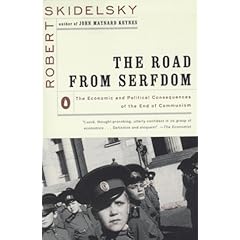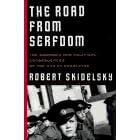
Where to start? A giant of the postwar world, one of the founders of modern conservatism, and a leading light who remade American politics,
died just over a month ago. Many tributes have appeared, and his positive influence is everywhere you look.
When World War Two ended,
American conservatism seemed to be finished. Although opposition to the increasingly statist bent of liberalism came from many and often conflicting points of view (individualism, religion, nativism, etc.), the two large forms of opposition were isolationism (opposition to American entry into the war - although that was not in any way purely a cause of the Right) and hostility to the dramatic expansion and pretensions of the federal government. Both oppositions appeared discredited, although disillusionment with the New Deal and federal intervention in general was widespread by the time of the 1940 election. And a significant part of the Republican party - its East Coast, Anglophile wing, led by Wendell Wilkie - did support intervention, in fact preventing foreign policy from becoming a major partisan issue in the 1940 and 1944 elections and marginalizing isolationism to a great degree. Nonetheless, while much of the New Deal had been repudiated after the 1938 midterm elections, everyone in 1940 knew what the great question was: to intervene or not, how fast and how deep. Of course, the Germans' undeclared submarine war of 1940-41 and the attack on Pearl Harbor at the end of 1941 rendered that debate moot. The US did intervene in World War Two, on the Allied side, and few regretted it afterwards, in spite of the immense cost and the dubiousness of having the Soviet Union as an ally.
Other factors were at work in the fragmented state of the American right in 1945. It had some of the same components familiar today. There were
conservatives, people who deferred to tradition because it was tradition. The fact that the American political tradition was largely a liberal one (with one major exception) created something of a paradox.* That tradition was one of limited government, one overturned by the socialist-tinged "new" or "reform" liberalism of the Progressive and New Deal eras. (The change was large enough that it is questionable whether the adjective "liberal" should be used at all.)
Classical liberals (later called
libertarians) never bought into tradition-for-tradition's-sake and based their views on straightforward, historically informed ideas (abundantly confirmed by recent experience in the world wars and totalitarian dictatorships) about the negative effect on human liberty and prosperity by too-large and too-powerful a government. Some went further and re-developed the familiar 18th-century theories of natural rights and consensual government in terms understandable to a 20th century audience. To that they added a more modern and deeper appreciation of the limits of social knowledge and the impossibility of social planning.
A striking fact astute readers might notice is that I make no mention of the "religious right" in this potted history. That's because, after the liberal-fundamentalist battles of the late 19th and early 20s centuries, the fundamentalists retreated to their own, anti-political, subculture. To the extend that they were political, they largely voted Democratic, because they were largely southern or urban-ethnic Catholic - and in those days, virtually all white southern and Catholic voters voted Democratic. The "religious right" as we now know it, an alliance between conservative Catholics and conservative Protestants, was 30+ years in the future at the end of the war. In 1945, a few feeble attempts at ecumenism apart, the relation between Protestants and Catholics was one of mutual suspicion, laced with ignorance and prejudice - although the war itself had had a strong positive impact on this state of affairs. The full scope of this impact is in large part the complete transformation of religious and ethnic identity in America in the postwar era. This transformation made black civil rights easier to swallow (for whites), gave rise to a new level of interreligious understanding, and made Buckley's type of "big tent" conservatism possible. All of these were out of reach and almost unthinkable before 1945. In his relationship with American Jews, Buckley's approach was even more radical, given the level of anti-Jewish prejudice still prevalent in 1945. By the late 1950s, his nascent movement and its allies counted a significant number of Jewish thinkers, many of them refugees from Europe and carrying first-hand experience of life under the totalitarian dictatorships. Well before the Republican party, under Nixon, fully embraced support of Israel, Buckley adopted such support as a matter of course, because he understood the basic issues at stake. When the Soviet Jewry movement started in the mid-1960s, Buckley and his followers were among its early non-Jewish allies and supporters.
Buckley was a wealthy liberal Catholic, a man from a social background (including a father who was an American ambassador) that, on the surface, seemed conventionally WASP. It was his quirky Catholicism that initially made the difference. It made him have to think - really think - about political issues in a deeper way than most people have to, people who take their political views without much thought from their parents, teachers, and peers. This led him initially to oppose modern American liberalism from a traditionalist point of view, but also made him open to libertarian approaches. From these experiences, he formed a clear conception of how to rebuild the American right around a few simple and broadly appealing stands that any rational person could assent to, without regard to ethnic or religious background: opposition to the growth of government at home and opposition to the dominant form of collectivist tyranny abroad, communism. Buckley and his allies founded
National Review, still the flagship of American conservatism, and began a campaign that stretched from the early 1950s to the late 70s to absorb all opposition to modern liberalism in this way. By doing this, Buckley sidestepped the leftover isolationist-interventionist debate and ended the American right's parochialism. By the late 1950s, all sorts of people, many Protestant, but a large minority of Catholics, and a surprising number of Jewish thinkers had been pulled into Buckley's movement, so much so that by the 1960s, the movement had become a broad political tendency in its own right and no longer a "movement." Buckley concentrated on the crucial common ground, dispensed with the provinciality and ethnocentrism of the prewar right, and even proved ecumenical enough to accept individualist and libertarian followers. (They often rejected him anyway, but that was their doing, not Buckley's.) Buckley even flirted with libertarianism himself, in his 1965 run for Mayor of New York and his famous, offshore 1960s pot parties on his yacht.
The era of Buckley's and conservatism's success was the late 70s and 1980s. In the 1960s, American liberals had obtained a blank check, under Kennedy and Johnson, and led themselves and the country, both domestically and internationally, into a gratuitous mess: instead of triumphing, liberalism went haywire and, after 1965, began a free-fall from which it has never recovered. The fact that the president who brought the Kennedy-Johnson tendencies to their logical conclusion - Richard Nixon - was a Republican seemed at first to set back the conservative cause. But Nixon was not a conservative. He was nominated in 1968 in part because he wasn't Goldwater and couldn't be tarred as a "crazy radical." The Watergate crisis (and the war that led to that crisis) were largely, and correctly, perceived as failures of the new, expensive, obtrusive, and frequently dysfunctional expanded government introduced by liberals. Nixon went along with it ("we are all Keynesians now," he famous said in 1972) and did big government a few times better - wage and price controls, entitlements and affirmative action as we now know them, and so on. His fall opened up a singular opportunity for conservatives, one taken by Reagan. The rest is history: a halt in the growth of domestic spending in the 1980s and 1990s, the successful and peaceful end of the Cold War, the end of "stagflation" and a generation-long success of low-inflation economic expansion and moderating the growth of the federal government. It was a stunning achievement, especially for a political movement - conservatism - that never gained majority acceptance. Buckley's approach saw to it that what we now call "identity politics" would not wreck his coalition and that, even when not having a strong influence over the Presidency, conservative
ideas and policies shaped by those ideas would have their continued impact. Certainly, the rise of Clinton in 1992 was a direct response - "neoliberalism" - to the prior failure of liberalism and the success of conservatism. Clinton went on, chastened by the 1994 mid-term elections, to become the most conservative Democrat since - well, Grover Cleveland.
Buckley, like his movement, spent more recent years in ill-health. Certainly, the decline of conservatism after 1994 troubled him. Even more troubling was the return of "Nixonism," in the form of Bush Jr. and Karl Rove. This tendency started at the end of the 90s with a grand throwing-up-of-the-hands by conservatives, a giving-up on ever implementing a conservative program. Being the majority party in Congress put them into the position of actually having to decide whether to go ahead with serious reform, and they couldn't do it. (Many thought conservative reform politically impossible.) Another disturbing trend was the return of authoritarian, big-government populism, as signaled by Perot in 1992 and 1996, with its powerful tendency to split the right-leaning vote. (Indeed, Perot made Clinton's election and re-election possible.) To capture these voters for the Republican party meant dropping much, if not all, of conservatism as Buckley and others had defined it. The prize was permanently incorporating white southern and Catholic voters into the Republican coalition. The price: alienating everyone else - and proving multiple times over that big government fails for an inherent reason, not just when it's done by liberals. It also led, on an intellectual level, to nasty disputes between conservatives and libertarians on one side and
neoconservatives on the other, those disaffected liberals who dropped out of the Democratic party in the 1970s and 80s. The opposition of many conservatives and libertarians to the Iraq war sharpened the nastiness.
Buckely's synthesis of traditionalism and "classical" liberalism (to use the L-word in its original and best sense) seemed unstable and incoherent to many. But it has proved enduring, like his very Catholic mix of faith and philosophical reason. It is both seriously intellectual, answering to that part of us that is consciously rational, and attractive because it recognizes the limits of individual reason. It combines with a classical liberal understanding of government a solid understanding of the limits of politics. Conservatives view society as more important than government, culture as more important than politics, and custom as more important than law. Buckley made his own contribution to culture as
a prolific author and as host of public television's
Firing Line for more than 30 years.**
He will be missed.
---
* That exception was the semi-medieval views that had taken hold in the antebellum South regarding slavery, which then influenced the dominant American thinking about race from the end of Reconstruction, in the 1870s, until the 1950s.
** When Binah was a youngster, he was confused by Buckley's sometimes notoriously Latin-inflected discussions on
Firing Line, reflecting Buckley's high-level Catholic education. Latin came later to Binah and, with it, some understanding of what Buckley was talking about. Buckley himself adopted a less erudite and more straightforward style in later years.
Labels: books, Buckley, Clinton, Cold War, Israel, Johnson, journalism, Kennedy, New Deal, Nixon, politics, Reagan, Roosevelt, world wars













